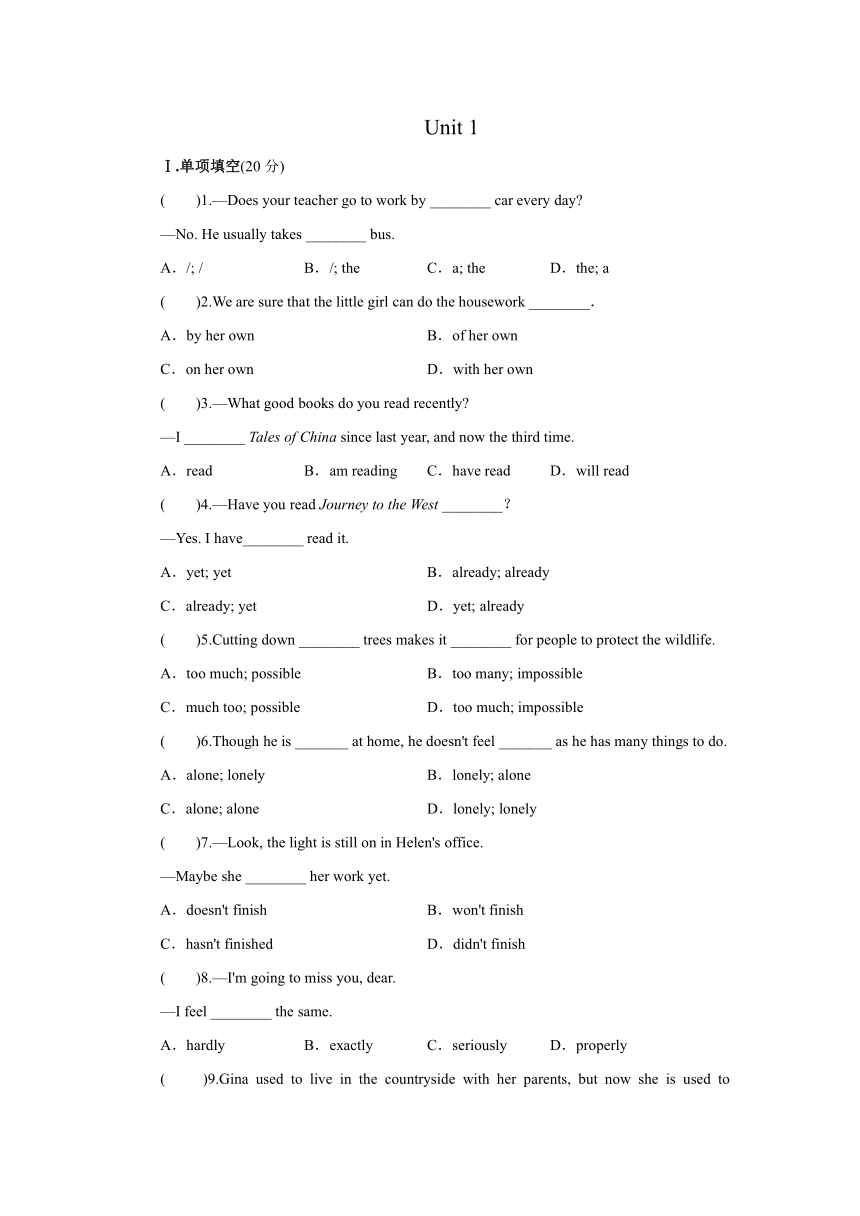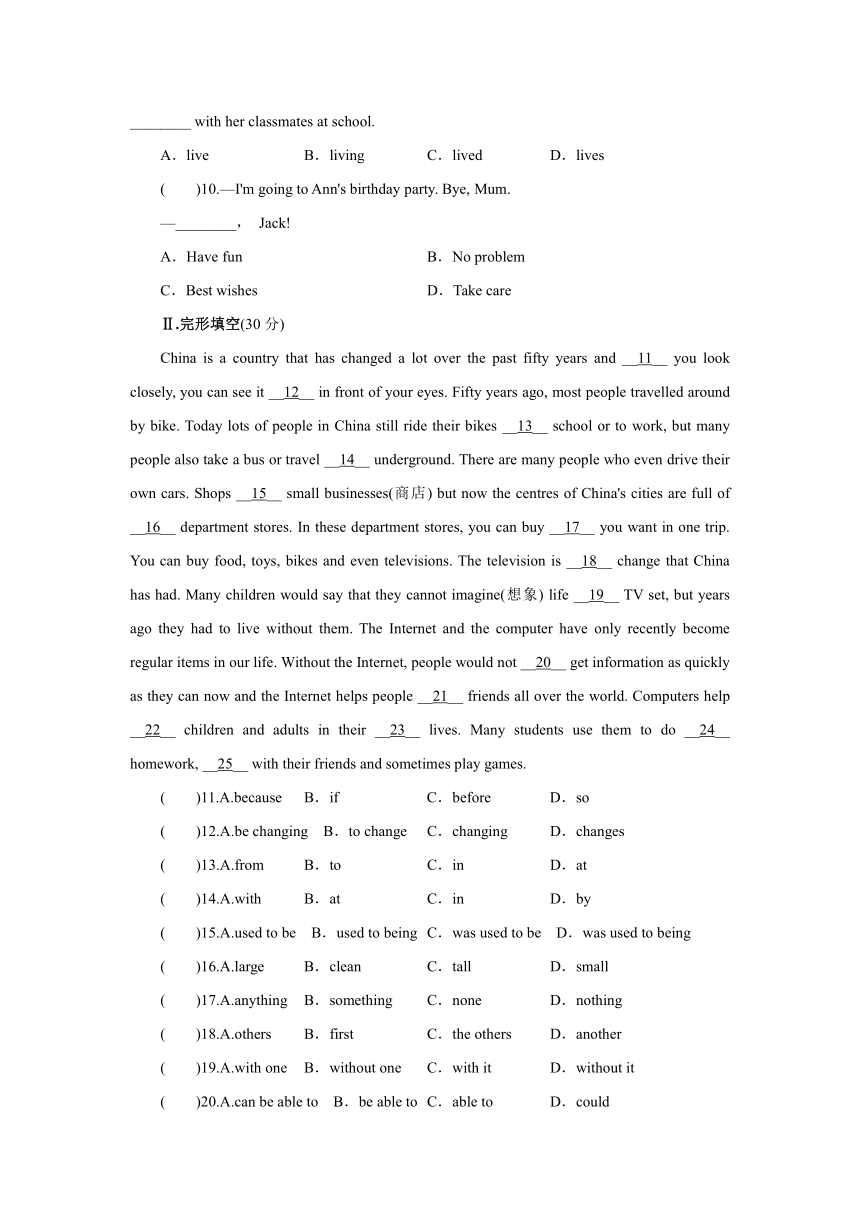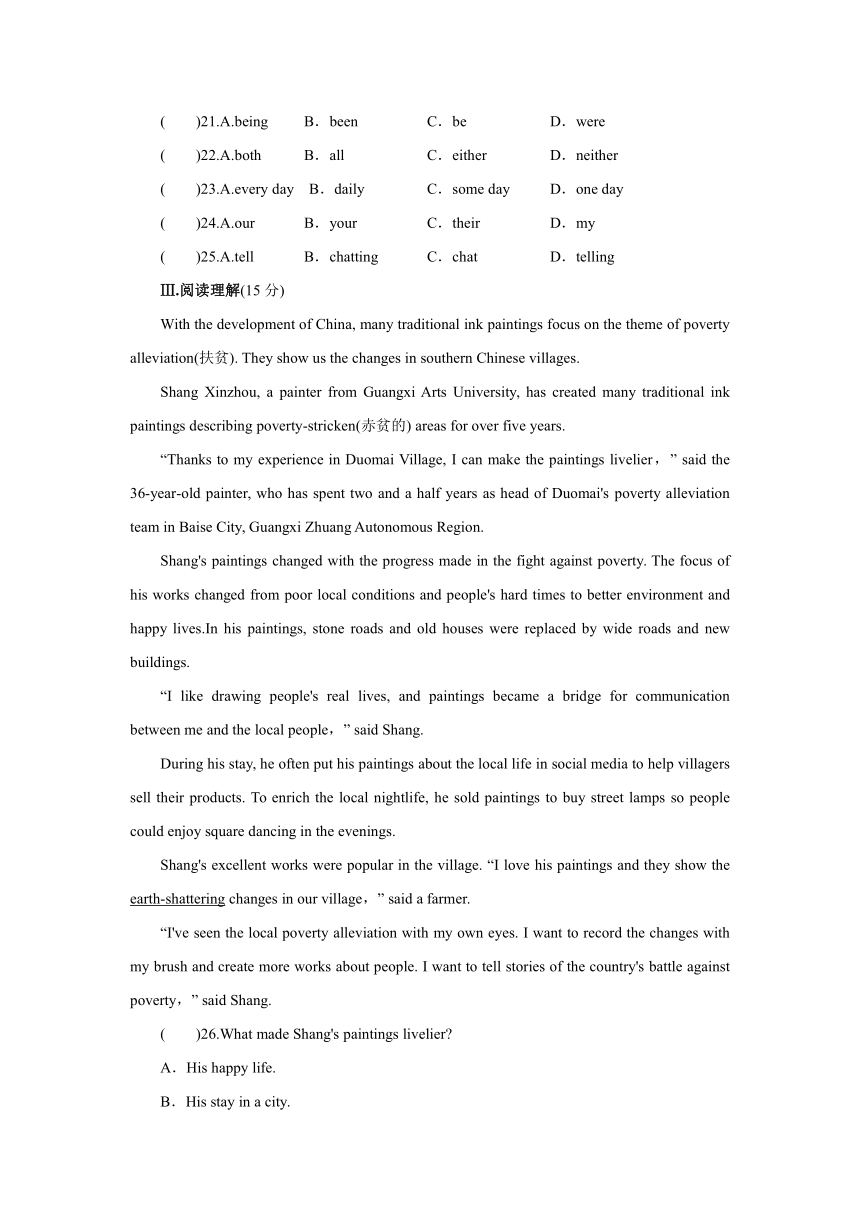牛津译林版英语八年级下册课时作业Unit 1 Past and Present 单元练习(含答案)
文档属性
| 名称 | 牛津译林版英语八年级下册课时作业Unit 1 Past and Present 单元练习(含答案) |  | |
| 格式 | docx | ||
| 文件大小 | 113.8KB | ||
| 资源类型 | 教案 | ||
| 版本资源 | 牛津译林版 | ||
| 科目 | 英语 | ||
| 更新时间 | 2022-04-01 15:34:53 | ||
图片预览



文档简介
Unit 1
Ⅰ.单项填空(20分)
( )1.—Does your teacher go to work by ________ car every day
—No. He usually takes ________ bus.
A./; / B./; the C.a; the D.the; a
( )2.We are sure that the little girl can do the housework ________.
A.by her own B.of her own
C.on her own D.with her own
( )3.—What good books do you read recently
—I ________ Tales of China since last year, and now the third time.
A.read B.am reading C.have read D.will read
( )4.—Have you read Journey to the West ________?
—Yes. I have________ read it.
A.yet; yet B.already; already
C.already; yet D.yet; already
( )5.Cutting down ________ trees makes it ________ for people to protect the wildlife.
A.too much; possible B.too many; impossible
C.much too; possible D.too much; impossible
( )6.Though he is _______ at home, he doesn't feel _______ as he has many things to do.
A.alone; lonely B.lonely; alone
C.alone; alone D.lonely; lonely
( )7.—Look, the light is still on in Helen's office.
—Maybe she ________ her work yet.
A.doesn't finish B.won't finish
C.hasn't finished D.didn't finish
( )8.—I'm going to miss you, dear.
—I feel ________ the same.
A.hardly B.exactly C.seriously D.properly
( )9.Gina used to live in the countryside with her parents, but now she is used to ________ with her classmates at school.
A.live B.living C.lived D.lives
( )10.—I'm going to Ann's birthday party. Bye, Mum.
—________, Jack!
A.Have fun B.No problem
C.Best wishes D.Take care
Ⅱ.完形填空(30分)
China is a country that has changed a lot over the past fifty years and __11__ you look closely, you can see it __12__ in front of your eyes. Fifty years ago, most people travelled around by bike. Today lots of people in China still ride their bikes __13__ school or to work, but many people also take a bus or travel __14__ underground. There are many people who even drive their own cars. Shops __15__ small businesses(商店) but now the centres of China's cities are full of __16__ department stores. In these department stores, you can buy __17__ you want in one trip. You can buy food, toys, bikes and even televisions. The television is __18__ change that China has had. Many children would say that they cannot imagine(想象) life __19__ TV set, but years ago they had to live without them. The Internet and the computer have only recently become regular items in our life. Without the Internet, people would not __20__ get information as quickly as they can now and the Internet helps people __21__ friends all over the puters help __22__ children and adults in their __23__ lives. Many students use them to do __24__ homework, __25__ with their friends and sometimes play games.
( )11.A.because B.if C.before D.so
( )12.A.be changing B.to change C.changing D.changes
( )13.A.from B.to C.in D.at
( )14.A.with B.at C.in D.by
( )15.A.used to be B.used to being C.was used to be D.was used to being
( )16.A.large B.clean C.tall D.small
( )17.A.anything B.something C.none D.nothing
( )18.A.others B.first C.the others D.another
( )19.A.with one B.without one C.with it D.without it
( )20.A.can be able to B.be able to C.able to D.could
( )21.A.being B.been C.be D.were
( )22.A.both B.all C.either D.neither
( )23.A.every day B.daily C.some day D.one day
( )24.A.our B.your C.their D.my
( )25.A.tell B.chatting C.chat D.telling
Ⅲ.阅读理解(15分)
With the development of China, many traditional ink paintings focus on the theme of poverty alleviation(扶贫). They show us the changes in southern Chinese villages.
Shang Xinzhou, a painter from Guangxi Arts University, has created many traditional ink paintings describing poverty stricken(赤贫的) areas for over five years.
“Thanks to my experience in Duomai Village, I can make the paintings livelier,” said the 36 year old painter, who has spent two and a half years as head of Duomai's poverty alleviation team in Baise City, Guangxi Zhuang Autonomous Region.
Shang's paintings changed with the progress made in the fight against poverty. The focus of his works changed from poor local conditions and people's hard times to better environment and happy lives.In his paintings, stone roads and old houses were replaced by wide roads and new buildings.
“I like drawing people's real lives, and paintings became a bridge for communication between me and the local people,” said Shang.
During his stay, he often put his paintings about the local life in social media to help villagers sell their products. To enrich the local nightlife, he sold paintings to buy street lamps so people could enjoy square dancing in the evenings.
Shang's excellent works were popular in the village. “I love his paintings and they show the earth shattering changes in our village,” said a farmer.
“I've seen the local poverty alleviation with my own eyes. I want to record the changes with my brush and create more works about people. I want to tell stories of the country's battle against poverty,” said Shang.
( )26.What made Shang's paintings livelier
A.His happy life.
B.His stay in a city.
C.His experience in a village.
D.His experience in a university.
( )27.Which may be Shang Xinzhou's last painting
A B C D
( )28.What did Shang do for the people in Duomai Village
①He taught them to dance.
②He bought them street lamps.
③He helped them sell their products.
④He taught them to create paintings.
A.①④ B.②④ C.①③ D.②③
( )29.The underlined word “earth shattering” in Paragraph 7 means “________”.
A.difficult B.great C.easy D.small
( )30.The passage mainly tells us a painter ________.
A.spent his whole life fighting against poverty in his city
B.tried to show the world traditional Chinese ink paintings
C.used his paintings to record the changes in southern Chinese villages
D.found the easiest way to make himself famous in his country
Ⅳ.用所给单词的适当形式填空(20分)
31.Radio and television are important means of ________(communicate).
32.It is ________(possible) to finish the work in such a short time.
33.________(luck), in winter, there is no problem in visiting any island you wish.
34.It is even colder in the ________(north) part of China in winter.
35.With the development of the economy, ________(pollute) will be a big problem.
36.He is________(exact) the man the police are looking for these days.
37.The two visitors' ________(wife) were quite worried about their husbands when they heard of the traffic accident.
38.He moved to another flat three ________(block)away from here.
39.In order to protect the environment, lots of________(factory) have been moved away from the people's living areas in the city.
40.—Have you been to Hong Kong ________(recent)
—No, I haven't.
Ⅴ.根据短文内容及首字母提示,写出所缺单词,使短文完整、通顺(15分)
There are many parks in the world. Most of the parks are very beautiful. I go to some famous parks with my father and mother. I like them very much. But my 41.f________ park is a small one near my home.
It's not very big but it's nice. There are many trees and flowers in it. Some of the trees are fruit trees. There are apple trees, pear trees and orange trees. When there are fruits on the trees, we can pick them. They are very delicious. I like oranges best. When 42.a________ comes, I go to the park to pick some oranges every day. I don't pick all of them. I know some other people like them, too.
In the morning, I like reading under the tree. The air is 43.f_________ and the park is very quiet. Some people do morning 44.e__________ here. Some run, some dance and some do yoga(瑜伽).
The best time of the year here is winter. When it snows, everything here becomes white. We can play with the snow. We make snowmen and have a snowball 45.f________.
I like this park best, because it gives me much happiness.
Unit 1
Ⅰ.1.B
2.C
3.C
4.D 5.B 6.A 7.C 8.B
9.B
10.A
Ⅱ.11—15 BCBDA 16—20 AADBB
21—25 CABCC
26.C
27.A
28.D
29.B
30.C
Ⅳ.31.communication
32.impossible
33.Luckily 34.northern
35.pollution 36.exactly
37.wives 38.blocks
39.factories 40.recently
Ⅴ.41.favourite 42.autumn 43.fresh
44.exercises 45.fight
Ⅰ.单项填空(20分)
( )1.—Does your teacher go to work by ________ car every day
—No. He usually takes ________ bus.
A./; / B./; the C.a; the D.the; a
( )2.We are sure that the little girl can do the housework ________.
A.by her own B.of her own
C.on her own D.with her own
( )3.—What good books do you read recently
—I ________ Tales of China since last year, and now the third time.
A.read B.am reading C.have read D.will read
( )4.—Have you read Journey to the West ________?
—Yes. I have________ read it.
A.yet; yet B.already; already
C.already; yet D.yet; already
( )5.Cutting down ________ trees makes it ________ for people to protect the wildlife.
A.too much; possible B.too many; impossible
C.much too; possible D.too much; impossible
( )6.Though he is _______ at home, he doesn't feel _______ as he has many things to do.
A.alone; lonely B.lonely; alone
C.alone; alone D.lonely; lonely
( )7.—Look, the light is still on in Helen's office.
—Maybe she ________ her work yet.
A.doesn't finish B.won't finish
C.hasn't finished D.didn't finish
( )8.—I'm going to miss you, dear.
—I feel ________ the same.
A.hardly B.exactly C.seriously D.properly
( )9.Gina used to live in the countryside with her parents, but now she is used to ________ with her classmates at school.
A.live B.living C.lived D.lives
( )10.—I'm going to Ann's birthday party. Bye, Mum.
—________, Jack!
A.Have fun B.No problem
C.Best wishes D.Take care
Ⅱ.完形填空(30分)
China is a country that has changed a lot over the past fifty years and __11__ you look closely, you can see it __12__ in front of your eyes. Fifty years ago, most people travelled around by bike. Today lots of people in China still ride their bikes __13__ school or to work, but many people also take a bus or travel __14__ underground. There are many people who even drive their own cars. Shops __15__ small businesses(商店) but now the centres of China's cities are full of __16__ department stores. In these department stores, you can buy __17__ you want in one trip. You can buy food, toys, bikes and even televisions. The television is __18__ change that China has had. Many children would say that they cannot imagine(想象) life __19__ TV set, but years ago they had to live without them. The Internet and the computer have only recently become regular items in our life. Without the Internet, people would not __20__ get information as quickly as they can now and the Internet helps people __21__ friends all over the puters help __22__ children and adults in their __23__ lives. Many students use them to do __24__ homework, __25__ with their friends and sometimes play games.
( )11.A.because B.if C.before D.so
( )12.A.be changing B.to change C.changing D.changes
( )13.A.from B.to C.in D.at
( )14.A.with B.at C.in D.by
( )15.A.used to be B.used to being C.was used to be D.was used to being
( )16.A.large B.clean C.tall D.small
( )17.A.anything B.something C.none D.nothing
( )18.A.others B.first C.the others D.another
( )19.A.with one B.without one C.with it D.without it
( )20.A.can be able to B.be able to C.able to D.could
( )21.A.being B.been C.be D.were
( )22.A.both B.all C.either D.neither
( )23.A.every day B.daily C.some day D.one day
( )24.A.our B.your C.their D.my
( )25.A.tell B.chatting C.chat D.telling
Ⅲ.阅读理解(15分)
With the development of China, many traditional ink paintings focus on the theme of poverty alleviation(扶贫). They show us the changes in southern Chinese villages.
Shang Xinzhou, a painter from Guangxi Arts University, has created many traditional ink paintings describing poverty stricken(赤贫的) areas for over five years.
“Thanks to my experience in Duomai Village, I can make the paintings livelier,” said the 36 year old painter, who has spent two and a half years as head of Duomai's poverty alleviation team in Baise City, Guangxi Zhuang Autonomous Region.
Shang's paintings changed with the progress made in the fight against poverty. The focus of his works changed from poor local conditions and people's hard times to better environment and happy lives.In his paintings, stone roads and old houses were replaced by wide roads and new buildings.
“I like drawing people's real lives, and paintings became a bridge for communication between me and the local people,” said Shang.
During his stay, he often put his paintings about the local life in social media to help villagers sell their products. To enrich the local nightlife, he sold paintings to buy street lamps so people could enjoy square dancing in the evenings.
Shang's excellent works were popular in the village. “I love his paintings and they show the earth shattering changes in our village,” said a farmer.
“I've seen the local poverty alleviation with my own eyes. I want to record the changes with my brush and create more works about people. I want to tell stories of the country's battle against poverty,” said Shang.
( )26.What made Shang's paintings livelier
A.His happy life.
B.His stay in a city.
C.His experience in a village.
D.His experience in a university.
( )27.Which may be Shang Xinzhou's last painting
A B C D
( )28.What did Shang do for the people in Duomai Village
①He taught them to dance.
②He bought them street lamps.
③He helped them sell their products.
④He taught them to create paintings.
A.①④ B.②④ C.①③ D.②③
( )29.The underlined word “earth shattering” in Paragraph 7 means “________”.
A.difficult B.great C.easy D.small
( )30.The passage mainly tells us a painter ________.
A.spent his whole life fighting against poverty in his city
B.tried to show the world traditional Chinese ink paintings
C.used his paintings to record the changes in southern Chinese villages
D.found the easiest way to make himself famous in his country
Ⅳ.用所给单词的适当形式填空(20分)
31.Radio and television are important means of ________(communicate).
32.It is ________(possible) to finish the work in such a short time.
33.________(luck), in winter, there is no problem in visiting any island you wish.
34.It is even colder in the ________(north) part of China in winter.
35.With the development of the economy, ________(pollute) will be a big problem.
36.He is________(exact) the man the police are looking for these days.
37.The two visitors' ________(wife) were quite worried about their husbands when they heard of the traffic accident.
38.He moved to another flat three ________(block)away from here.
39.In order to protect the environment, lots of________(factory) have been moved away from the people's living areas in the city.
40.—Have you been to Hong Kong ________(recent)
—No, I haven't.
Ⅴ.根据短文内容及首字母提示,写出所缺单词,使短文完整、通顺(15分)
There are many parks in the world. Most of the parks are very beautiful. I go to some famous parks with my father and mother. I like them very much. But my 41.f________ park is a small one near my home.
It's not very big but it's nice. There are many trees and flowers in it. Some of the trees are fruit trees. There are apple trees, pear trees and orange trees. When there are fruits on the trees, we can pick them. They are very delicious. I like oranges best. When 42.a________ comes, I go to the park to pick some oranges every day. I don't pick all of them. I know some other people like them, too.
In the morning, I like reading under the tree. The air is 43.f_________ and the park is very quiet. Some people do morning 44.e__________ here. Some run, some dance and some do yoga(瑜伽).
The best time of the year here is winter. When it snows, everything here becomes white. We can play with the snow. We make snowmen and have a snowball 45.f________.
I like this park best, because it gives me much happiness.
Unit 1
Ⅰ.1.B
2.C
3.C
4.D 5.B 6.A 7.C 8.B
9.B
10.A
Ⅱ.11—15 BCBDA 16—20 AADBB
21—25 CABCC
26.C
27.A
28.D
29.B
30.C
Ⅳ.31.communication
32.impossible
33.Luckily 34.northern
35.pollution 36.exactly
37.wives 38.blocks
39.factories 40.recently
Ⅴ.41.favourite 42.autumn 43.fresh
44.exercises 45.fight
